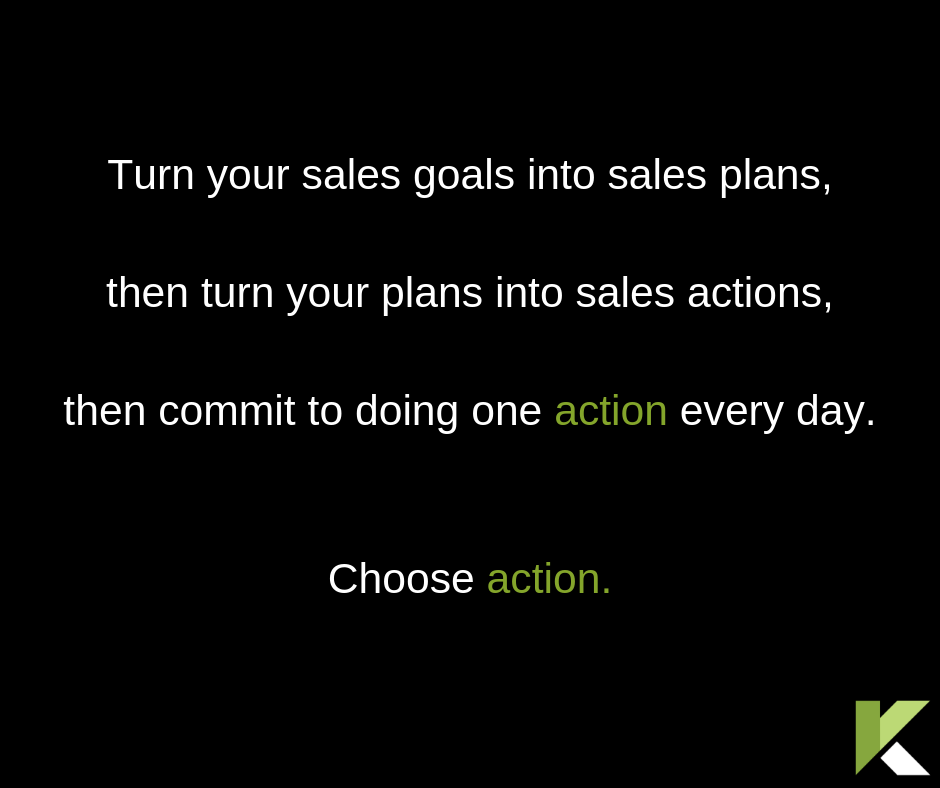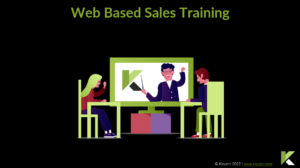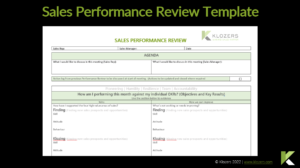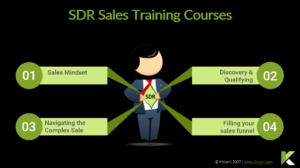Virtual Sales Training – Top question from Google
1. Personal preparation
2. Ensure you are in a positive environment
3. Connectivity
4. Sound
5. Camera
6. MS Teams & Zoom
7. Branding
8. Planning
9. Relationships
10. Value
11. Next Steps
1. Virtual Selling
Virtual selling has gone from something that only a few inside sales professionals did, to the norm for nearly every sales rep. The lockdowns forced salespeople and buyers alike to go online, in order to keep sales flowing and businesses running.
For many reps this was, and possibly still is an uncomfortable change from the freedom of more traditional field sales. With their company cars firmly parked on the drive many salespeople moved into their spare bedroom at home where they wrestled with their kids and spouse for broadband capacity.
Human beings are not naturally wired for change. Change is awkward, uncomfortable and even frightening for some, and sadly many did not survive.
The good news was that Buyers were also forced into moving online. Whereas previously there was a desire to physically meet the people they were buying from, Zoom and Teams calls quickly became the new normal for virtual sales meetings.
As I write this the lockdowns have largely gone, some restrictions still apply but for the most part we are back and allowed to travel. Despite this, virtual sales meetings, workshops, training and sales for us continue online.
We’ve never refused to meet with a client or deliver sales training face to face, it just seems that the demand is just not there, the way it was previously.
Will it come back? Yes I am sure to some degree but largely no because companies have realised the costs associated with keeping sales reps on the road is huge and it’s also pretty inefficient.
If this resonates with you and you need to learn more about how to sell virtually then please read on.
2. Virtual Sales Techniques – 5 sales techniques to master
What is the difference between a sales technique and a sales skill? Techniques are a series of actions and activities that make up a skill.
In sales the ability to generate sales leads is a skill. The skill is made up of a series of techniques such as; research, planning, strategy, execution etc.
In many cases salespeople who are skilled at certain things have simply gone through a process of techniques so many times they are committed to their muscle memory and can perform the skills without thinking through the different techniques they are using.
Here are our top 5 techniques we recommend you focus your sales teams development on as part of your virtual training workshops.
- Body Language. In face-to-face meetings it’s normally easy to observe your prospects body language, however, this is not always possible when selling remotely. Often prospects sit so close to their cameras the only thing you can see is their heads or torso if you are lucky. You must therefore pay more attention to eye movement, hand movement, facial expressions and the overall state of the prospect.
- Listening skills. When you’re telling you’re not selling. The value in any sales person is not in the information they give but the information they gather. Online more than ever, it’s important to ask questions and LISTEN plus. Listening plus is what we call active and responsive listening. Take notes furiously but ensure you ask permission to takes notes in order that your prospect knows that you are note taking and not just distracted by an incoming email.
- Empathy. This is an often-overlooked skill, but nonetheless important one. Empathise and where suitable rescue the prospect as they relive the Business Pain that brought them to you. Rescue them emotionally not in reality as your role is not to solve the pain but to understand how important it is to remove the pain.
- Insight. The bots are coming and AI is going to revolutionise sales once more. Those that survive will be the best of the best but in addition to being great salespeople they will be subject matter experts. They will use their knowledge to create powerful questions that make the prospect stop and think. The questions will challenge the prospects preconceptions and where appropriate make the prosect so uncomfortable with their business pain that they need to take action to resolve it.
- Consultative selling skills. Nobody likes to be sold to but we all love to buy. Salespeople using Consultative sales techniques never sell anything – instead they simply make the conditions right for the buyer to buy. This takes emotional intelligence, self-awareness, domain knowledge and expertise through practice and experience.
3. Virtual Selling Skills
As previously discussed, virtual selling skills are simply an accumulation of a number of different sales techniques executed brilliantly.
Selling virtually is a skill which is comprised of a number of the 5 sales techniques listed above.
In order to build your muscle memory and become proficient at virtual selling you must first focus on the techniques and practice them relentlessly. In Malcolm Gladwells book “Outliers” he claims it takes 10,000 hours to master a skill.
We are not saying it will take you 10,000 hours, however, you will never master virtual selling in a week. Practice, practice, and when you are done practicing, role play, role play and record each session on video.
Yes, this is hard work. Anything that is worthwhile will never come easy. There is no substitute for hard work.
With that said, delivering sales training that improves the virtual selling skills of your sales team will have a huge impact in both confidence and results.

4. Virtual Sales Training Example
FQE Chemicals of Deer Park Texas wanted to invest in their sales team as part of an new growth initiative. As an international company their salespeople were split between the USA and the UK so virtual selling was not new to them.
As a company they regularly help virtual sales meetings with prospects and customers so it was important that the sales training content was based around virtual selling and the relevant skills needed. They decided that online sales training was there preferred choice.
FQE had an initial virtual meeting with a Klozers sales trainer where they discussed the needs and unique challenges of the sales team and Klozers created a bespoke training program for them. The instructer led training was delivered virtually via Klozers bespoke virtual learning environment.
The training program was spaced out over 3 weeks to give the participants time to retain information and learn new skills. The online classroom settings were facilitated by an experienced sales trainer who after building trust among the participants included roleplay sessions so the could practice the new skills they had learn’t.
5. Sales Training Presentations
At Klozers we typically have a slightly different take on virtual meetings and sales presentations than most sales teams. What we mean by this is: The presentation is only there to CONFIRM the sale.
If, as a salesperson you are hoping that your sales presentation will convince your prospect to buy, you have missed a few important steps earlier on in the sales process. Questions sell, presentations tell.
We fully appreciate this may seem unusual but through our experience, the experience of our clients and the data we have collected around this, we standby this 100%.
That does not mean that you should never give a virtual presentation, but it does mean that every sales presentation should be heavily qualified before-hand.
If you are delivering sales presentations via virtual meetings then here are some ideas for you:
- Ensure you uncover the top 3 business pains that relate to your solution early in the sales cycle
- Get your prospect to quantify the pains in terms of much they are costing the business
- Ensure you know what the prospects buying process is and who needs to be involved
- Discuss in advance what the next steps would be if they love your presentation
- Understand how the pains affect the prospect personally
- Discuss CONTA – the cost of not taking action
- Make it easy for them to get started

6. How effective is Virtual Sales Training
Virtual sales training can be an effective way to help a sales team develop new skills and knowledge, as long as it is well-designed and provides a high level of engagement and support.
Some advantages of virtual sales training include:
- Convenience: Virtual training can be accessed from any location with an internet connection, making it convenient for busy professionals who may not have the time to attend in-person training sessions.
- Flexibility: Virtual training often offers a range of delivery methods, such as video lectures, interactive modules, and simulations, which can make it more engaging and interactive for participants. This can also make it more flexible for learners with different learning styles.
- Cost-effectiveness: Virtual training can often be more cost-effective than in-person training, as it does not require participants to travel or take time off work.
- Customization: Virtual training can be tailored to the specific needs and goals of a sales team or individual, which can make it more effective in helping participants develop the skills and knowledge they need to be successful.
Overall, virtual sales training can be an effective way to help sales professionals develop their skills and knowledge, as long as it is well-designed and provides a high level of engagement and support.
7. Virtual Sales Training
Klozers have been providing virtual sales training workshops since 2018 – before the first of the lockdowns. Our virtual training is delivered via a custom built environment within Microsoft Teams.
In addition to sales skills training we focus heavily on changing sales behaviours, increasing productivity and working with sales management to make sales professionals more accountable.
We share the exact strategies both inbound and outbound that probably brought you to this website, so you know what we teach is both real and works.
Each of our sales training courses has been specially adapted for the virtual environment. This included a complete review of the sales training content to ensure it was not just suitable but, to the same level of sales excellence as our in person training.
Each training program starts by identifying the key objectives from a sales management perspective, which are then developed into key concepts. From this we can derive any new skills training required and the best format for the training to them be delivered virtually by a combination of video conferencing and a series of virtual meetings.
Our training programmes are each led by an expert sales trainer who have themselves been retrained to deliver the maximum impact in each training session within in a virtual setting.
Classes are designed to include all the sales skills required by sales professionals throughout the sales process with time dedicated to role play.
8. Klozers Sales Training
Klozers delivers virtual training and coaching across different industries. Our sales training can be delivered both In person or delivery virtually for your sales team. In many cases our clients opt for a hybrid model of sales training, whereby the initial sales training session is delivered In person and then followed up and reinforced with our virtual training and coaching.
In addition to our formal training, more and more of our clients are opting for bespoke training where we work with their sales leaders in advance to identify the key objectives and key concepts they need they need from each training session.
This ensures that the sales training content for each training session is relevant, engaging and covers the skills needed for virtual selling.







